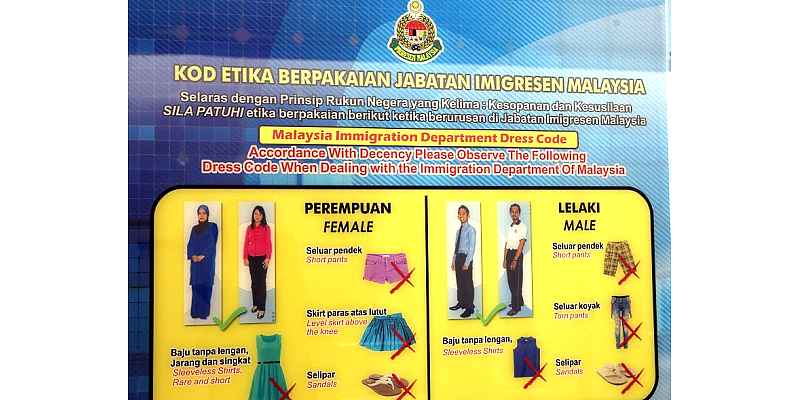We have the freedom to put on whatever we deem appropriate, so long as it is not too sexually explicit or disrespectful for specific occasions.
Many of Malaysia’s government departments have set their own dress codes for visitors, to which the public will generally conform.
However, the dress code is not a fixed set of rules but just a guideline, as whether how a person dresses is deemed appropriate is entirely subjective.
Unless during a formal function where the official dress code is strictly adhered to, we shouldn’t let the issue of attire affect the normal delivery of government services.
Lately there have been reports of women lodging a report at the police station or visiting a hospital for treatment but have been turned away because they were wearing shorts. At the same time, there have been people visiting government offices in appropriate attire but were also rejected by the security personnel.
In recent years many public service offices appear to have been overly engrossed with how a visitor should be dressed, attesting to the fact that indeed many in the civil service are still very much absorbed in conservative thinking.
When someone visits a police station to seek assistance, or is badly injured or suffering a severe chronic illness and urgently needs medical attention at a government hospital, it is imperative for the police or medical personnel on duty to immediately hold out a helping hand instead of scanning them for what they put on.
It looks like the professionalism and empathy of these people have been clouded by their excessively conservative mindset.
Not only ordinary civil servants have this kind of thinking, even their superiors are not much different.
The IGP has earlier instructed police stations nationwide to be more flexible in dealing with the dress code. However, he insisted that members of the public must still be appropriately attired when visiting a government office.
He is not alone. Home minister Saifuddin Nasution Ismail has also conveyed the same kind of message to the public.
As a matter of fact, ministers and other senior government officials should rectify their subordinates’ over-reaction to stipulated dress code and should instruct them to review any inappropriate guideline as soon as possible instead of condoning the little Napoleons’ antics of making life difficult for people on all kinds of reasons and excuses.

Health director-general Noor Hisham Abdullah has clarified in response to the incident at Kampar Hospital that while some attire may not be appropriate when a person visits a house of worship, there isn’t any so-called dress code within the premises under the jurisdiction of the health ministry, including government hospitals and clinics.
Health minister Dr. Zaliha Mustafa has also stressed that healthcare personnel must adhere to the code of conduct, and treat everyone equally regardless of race or attire.
Meanwhile, the Kampar Hospital director said the officer involved had been reprimanded. He also reminded hospital staff not to accord differential treatment to patients based on their attire.
Whether a person’s attire should continue to become a threshold before entering a government office needs to be distinctly specified.
Some scholar has pointed out that in accordance with the fifth principle of Rukun Negara “Courtesy and Morality,” the objective of setting a dress code is to promote unity among Malaysians through respectable conduct.
Indeed, courtesy and law compliance are a part of the Rukun Negara which all Malaysians must understand and put into practice in order to preserve national harmony. Nevertheless, we shouldn’t make a big fuss about attire, for national harmony could be sabotaged by these overzealous little Napoleons.
As mentioned earlier, dress code is not a fixed set of rules. We cannot agree with the scholar who insists that dress code ought to be enforced for the sake of social harmony.
We have the freedom to put on whatever we deem appropriate, so long as it is not too sexually explicit or disrespectful for specific occasions.
In short, as long as a person has not done it in purpose, any attire which is not contravening the country’s conventionality should not become an issue at all.
Politicians and religious moralists must exercise some self-restraint when censuring the female uniform of specific organizations lest it spawn a racial issue and trigger unnecessary misunderstanding.
While we agree that dress code does serve its purpose, we must also understand that such guidelines are not legally binding and we do not need to enact some new laws just to avert similar controversies over recent attire disputes.
If we do, it will become excessively rigid and not flexible, and we believe flexibility works much better in meeting the needs of our culturally diverse Malaysian society, where a milder approach is preferred when dealing with similar cases.
Moreover, how is the law going to define a decent attire, which is itself a highly subjective matter in any civilized society? People from different ethnic, religious and lifestyle backgrounds have their own sets of dress codes in accordance with age and nature of professions.
In short, in a mature democratic society, people should know what to wear on what occasion or time. We must be more accommodating when it comes to one another’s right of dressing, as this is how we manifest our courtesy and respect for others.
ADVERTISEMENT
ADVERTISEMENT


































